- Bernard Preston homepage
- Corn
- Wholegrain Cornmeal
Wholegrain cornmeal
Wholegrain cornmeal gives me a bellyache unless I allow it to retrograde overnight.
In America it's called grits; in South Africa maizemeal and a dry porridge known as putu.
I think it’s common knowledge that the Zulu people do not like wholegrain maizemeal because it gives them a bellyache; yet their forefathers have enjoyed it for centuries. I must confess it also provokes indigestion in my white tum too if eaten immediately after cooking.
The result is that the Zulu people eat super-refined cornmeal. The first and foremost problem is that devoid of all the nutrients, it is absolutely tasteless; masses of sugar and salt must be added.
Instead we have learned to retrograde it overnight and bring it back to the boil in the morning. Then add a teaspoon of natural honey to our tasty wholegrain cornmeal, a tad of butter and some fruit; and a little unpasteurised yoghurt or maas[7]. It's completely gluten-free.
Leaving it to stand for a period also enables the bran to hydrate completely.

Most white people in South Africa don’t eat the porridge, wholegrain or refined except occasionally perhaps as pap with a braai. Instead they like cornflakes, equally devoid of natural nutrients and flavour with the same net result. Too much sugar and salt are added; and in this case a massive fifteen-times rise in price.
- Yellow corn in January, 2023 costs R4,600 / ton
- Cornflakes costs R70,000 / ton.
- White Star super maizemeal costs R10,520 / ton
- (R262,95 /25kg Makro)
 Highly-processed junk food.
Highly-processed junk food.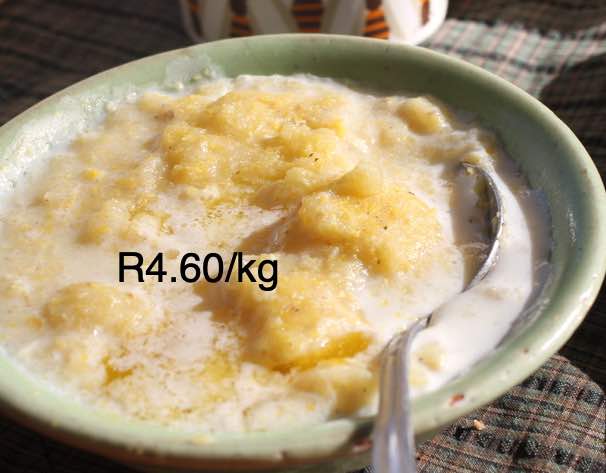 Very nutritious wholegrain.
Very nutritious wholegrain.It’s also common knowledge that in many Zulu villages half of the children are permanently stunted, mentally and physically.
Permanently as the damage done by a poor diet in early childhood cannot be fixed, not now nor ever.
Is there a connection between the bellyache from eating wholegrains and stunting? There most certainly is. Millers remove not only the germ and bran but also much of the protein, ostensibly to please the consumer; but in addition they are able to sell the best parts at great profit to farmers for animal feed.
If not a frank kwashiorkor certainly there is a subclinical deficiency of amino acids in the diet of many children in South Africa.
All the nutritional research, and there’s heaps of it, is that whole grains are good for us but those that are refined makes us fat and raise the specter of type-2 diabetes; in part because of all the sugar that has to be added to give them some taste.
As an ardent believer in whole grains it’s a fact that I have had to face. Both a fresh loaf of bread made from 100% flour and our coarse-ground cornmeal have to be eaten with caution; bellyache if I do not allow it to retrograde.
"Nothing is less productive than to make more efficient what should not be done at all."
- Peter Druker
The solution was discovered entirely by accident. Wholegrain cornmeal takes extra cooking for the bran to hydrate properly, so I prepare enough for several days and keep the leftovers in the fridge. Lo and behold, initially it gives me dyspepsia but once cooled overnight and reheated the next morning there is absolutely no pain after breakfast.
In similar vein experienced bakers say we should never eat bread straight from the oven; ostensibly because cooling gives time to bring out the flavour. But also, enjoying today’s 100% wholegrain loaf tomorrow means no bellyache for me.
Gluten is often wrongly fingered, I believe, as the cause of the bloating and pain from eating bread. It is far more complex than that. A chemical, transglutaminase that is commonly added to the commercial loaf certainly shares some of the guilt; perhaps most of it. And so does enjoying any slice when it’s too fresh.
Starch
True 100% wholegrain cornmeal contains much less starch than wheat, oats or rice; 18% by weight. That's the same as corn on the cob.
However remembering that it is almost unavailable commercially, typically available cornmeal in the grocery store contains a massive 74% of starch. In fact it tops the list.
Carbs come in three types; sugar, fibre and starch.
So having turned full circle, avoid cornmeal unless you can find a completely unrefined grain that still contains all the fibre; remember that it has a very limited shelf-life because of the natural healthy fat in the germ.
If you simply love grits you will probably have to buy a mill.
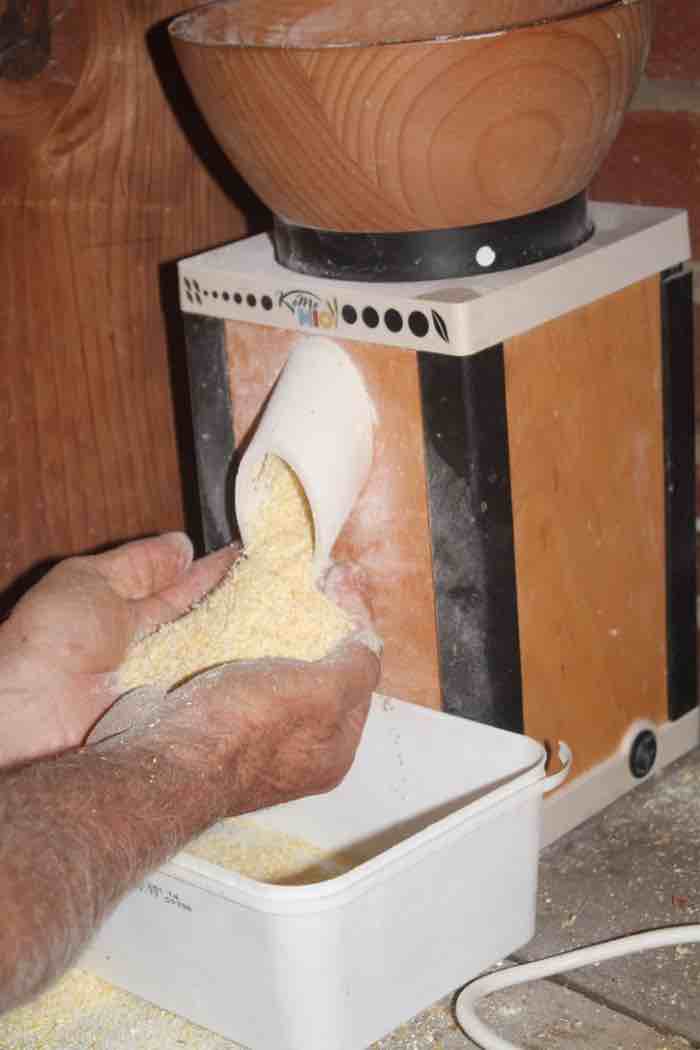 100% wholemeal corn
100% wholemeal cornRetrogradation
So what happens when a starch is cooked and then cooled, with the possibility of reheating the following day in the case of a porridge?
It’s complex biochemistry, so I will not go into the details but starches consist of long chains of sugar molecules. When they are cooked they lose their crystalline structure, absorbing water and forming a gooey mess. They are then readily digested by enzymes in the small intestine turning them rapidly into many thousands of glucose units.
They are then rapidly absorbed into the portal blood stream, taken to the liver where the molecules are turned into triglycerides, glycogen and other compounds. In short, refined starches cause a sharp spike in blood glucose, especially in those who are insulin resistant; which many of us are if we have been living on a diet high in carbs and sugar.
But if that gooey mess is first cooled before being consumed, it regains its crystalline structure with powerful hydrogen bonds linking the glucose molecules together. This slows the action of the enzymes that digest the food and a greater proportion passes unaffected through the small intestine, reaching the colon instead where it is fallen upon by the bugs known as the normal flora.
In biochemical terms, refrigerating your cooked carb “retrogrades” the molecules, turning it into so-called resistant starch; retarding the digestion and absorption as glucose in the small intestine.
Highly refined cornmeal, eaten freshly-cooked certainly spikes our blood glucose; it also has little of the fibre, protein and fat that slow absorption. Add salt and sugar and one is well on the way to T2D; Dr Campbell’s twenty year diabetes rule[1] is invoked.
Dr George Campbell, MD
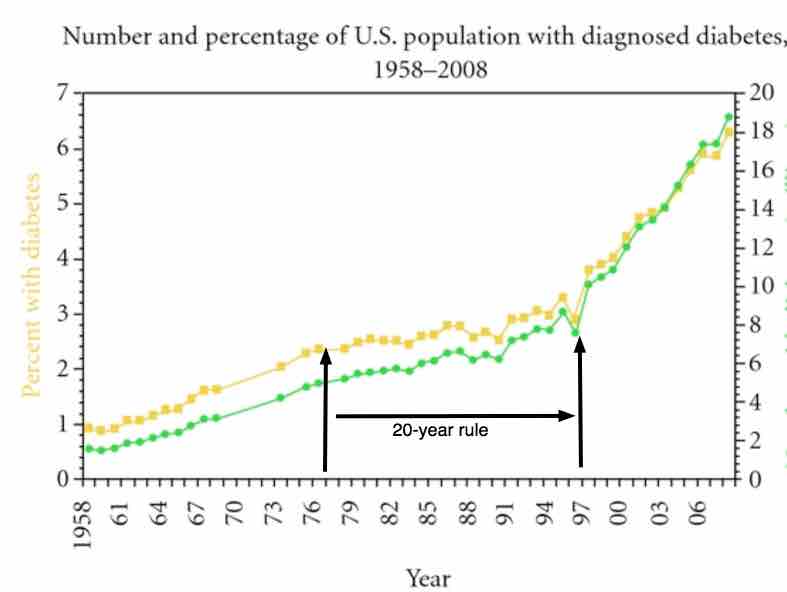
Dr George Campbell was a truly remarkable medical doctor who did immensely powerful research on the Indians and Zulus in KZN as they became urbanised. Alas his work and recommendations as far as refined carbs and sugar are concerned have been totally ignored resulting in the calamitous state of affairs of well-being in South African. We are one of the very most unhealthy countries in the whole world.
George Campbell's 20-year diabetes rule stands unchallenged and accepted in the scientific world. Refined carbs make us obese and T2D now is prevalent in over 30% of many adult population groups in South Africa.
But let's return to wholegrain cornmeal giving us a bellyache. No one seems quite sure but other things also happen when we allow starches to retrograde; they no longer give us pain as they would when newly-cooked.
I’m uncertain but I suspect that the traditional way of making wholegrain putu before the arrival of the modern mill may get around the bellyache of freshly-prepared starches. The use of maas, a fermented milk product which is acidic slows gastric emptying and helps to stabilise blood glucose too.
The net result of all this is that affordable whole grains are extremely difficult to come by because folk do not have the patience or understanding to allow them to retrograde overnight; or grind them in the traditional way.
An innovative East Griqualand miller sells excellent white cornmeal at the Rotunda but alas there is no sell-by date; you have no idea when it was ground.
The farmers’ market at Reko Hilton is the only other place that I know of where freshly ground maize and wheat can be purchased.
Functional foods
Unfortunately there is little understanding of these matters at the Department of Health it would seem; there are no attempts on their part to warn people of the dangers of consuming refined grains.
And even many well-meaning NGOs include white rice, sugar and super refined cornmeal in their “basic” food baskets and supply them to the hungry.
Allow your wholegrain
starches to retrograde; tuck in and enjoy them. They are “functional foods”[2] rich in
vitamins, minerals and protein; good fat, fibre and phytonutrients that
promote health and help prevent disease.
The happy tum
Nearly 50% of people have an unhappy tum, in one way or another. That might be dyspepsia due to a hiatus hernia, constipation and other more complex conditions; gluten or lactose intolerance, for example.
Wholegrain cornmeal contributes without a doubt to the happy tum but it does need to be prepared with discretion; allowing time for full hydration and retrogradation of the starch is important.
As is regular use of probiotic foods to supply the microbiome; the 2kg of friendly bugs in the tum that are absolutely essential for wellness. Required is not only a large number of bacteria, viruses and yeast cells but also the diversity of these helpful little creatures; so we recommend kefir[5] and other fermented dishes like maas and sauerkraut too.
Natural unprocessed honey incidentally has a low GI.
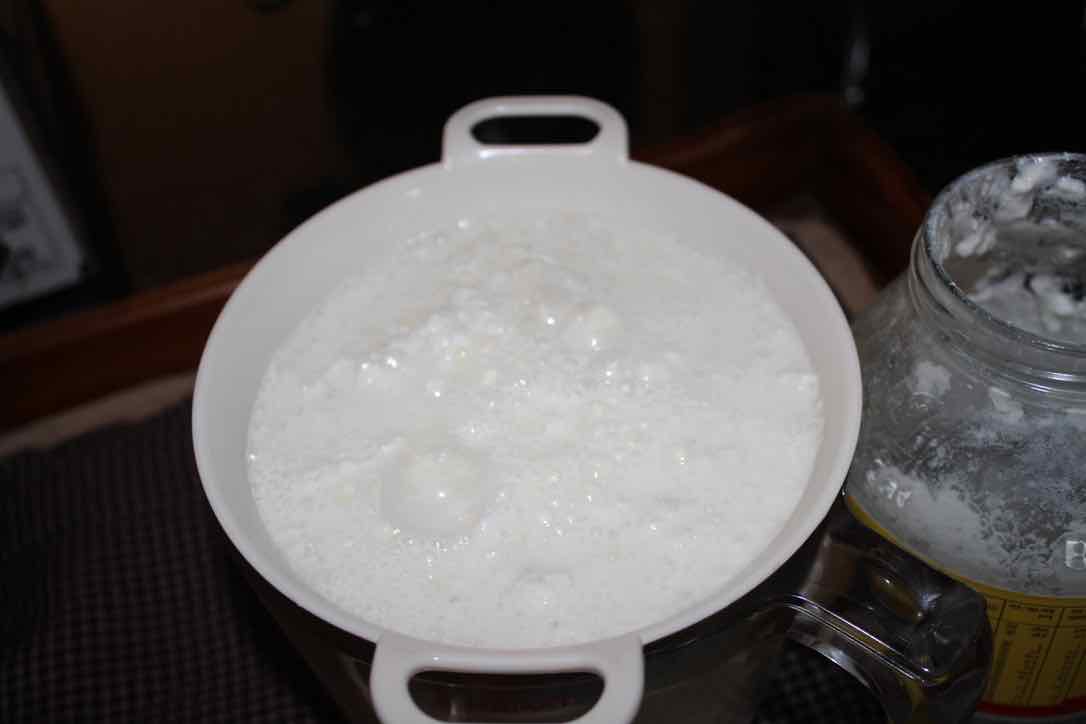 Kefir is a very strong yoghurt.
Kefir is a very strong yoghurt.Your wholegrain cornmeal provides the fibre that the microbiome must have; it also helps prevent constipation.
How to make homemade cornbread ticks all the right boxes; nutritious, relatively quick and very tasty. What's more it can be retrograded to lower the GI even further; and supply more resistant starch to the microbiome.
Wholegrain cornbread
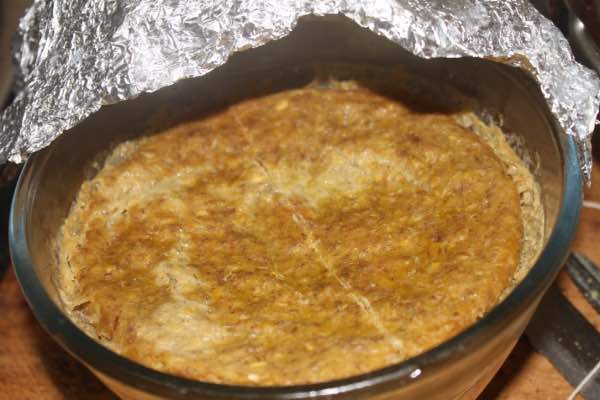 Cornbread made with 100% meal.
Cornbread made with 100% meal.Wholegrain cornmeal
Wholegrain cornmeal known as grits in America should be allowed to retrograde overnight.
When browsing use right click and "Open Link in New Tab" or you may get a bad gateway signal.
Newsletter
Our newsletter is entitled "create a cyan zone" at your home, preserving both yourself and Mother Earth for future generations; and the family too, of course. We promise not to spam you with daily emails promoting various products. You may get an occasional nudge to buy one of my books.
Here are the back issues.
- Lifestyle and ideal body weight
- What are ultra-processed foods?
- Investing in long-term health
- Diseases from plastic exposure
- Intensive lifestyle management for obesity has limited value
- A world largely devoid of Parkinson's Disease
- The impact of friendly bacteria in the tum on the prevention of cancer
- There's a hole in the bucket
- Everyone is talking about weight loss drugs
- Pull the sweet tooth
- If you suffer from heartburn plant a susu
- Refined maize meal and stunting
- Should agriculture and industry get priority for water and electricity?
- Nature is calling
- Mill your own flour
- Bake your own sourdough bread
- Microplastics from our water
- Alternative types of water storage
- Wear your clothes out
- Comfort foods
- Create a bee-friendly environment
- Go to bed slightly hungry
- Keep bees
- Blue zone folk are religious
- Reduce plastic waste
- Family is important
- What can go in compost?
- Grow broad beans for longevity
- Harvest and store sunshine
- Blue zone exercise
- Harvest and store your rainwater
- Create a cyan zone at your home
Did you find this page interesting? How about forwarding it to a friendly book or food junkie? Better still, a social media tick would help.
- Bernard Preston homepage
- Corn
- Wholegrain Cornmeal
Address:
56 Groenekloof Rd,
Hilton, KZN
South Africa
Website:
https://www.bernard-preston.com